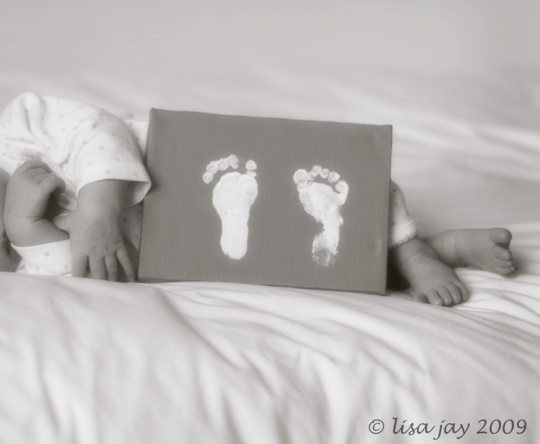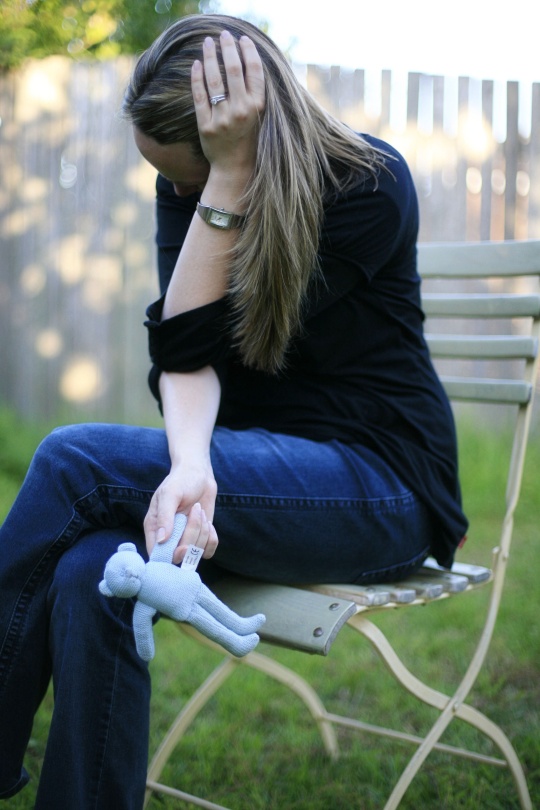Thursday October 15 is International Pregnancy and Infant Loss Remembrance Day. This poem, by Dorothy Ferguson, is published in the book Be Fertile With Your Infertility by Christine Bannan and Winnie Duggan.
Footprints
How very softly
you tiptoed into my world.
Almost silently
only a moment you stayed.
But what an imprint
your footsteps have left
upon my heart.

Edited extract from a photo by Lisa Jay
In loving memory of baby Samuel.
28.05.09

Photo by Lisa Jay
OK so I don’t want to just become known as the ‘miscarriage chick’, but I have had five of them so I think I’m qualified to write on the subject. It’s only natural that since I’ve blogged on this topic once or twice before that people I meet tend to share their own journeys with me. And the issue that comes up most often when people open up on this topic is how much their pain has been magnified by the insensitive treatment of family or friends.
Naturally I can’t give you a definitive list of DO’s and DON’Ts because everybody reacts differently. I’m also not out here to point the finger at anybody. But I think a good starting point would be to tackle some of the common assumptions that people make.
Firstly, don’t assume that you know what’s going on. Infertility doesn’t only affect that couple who’ve been married for 13 years and don’t have kids yet. Infertility can strike anyone at any time. That family you know with two school-aged girls? They could have been trying for another baby for the last six years. That young couple who always joke that they’d rather have a dog – she might have had cancer treatment when she was young and not be able to have children. And then there’s the loss and grief of those people whose circumstances have robbed them of the chance to have children. That friend who recently divorced – she might be overwhelmed by the sudden realization that she won’t have another child. Your single friend, who just turned forty, might be grieving the baby she terminated at seventeen. Your grandmother might hold your newborn and weep over a stillborn baby you never knew about. These are just some of the situations that people deal with in their lives, but here’s my point, people – YOU JUST DON’T KNOW WHAT’S GOING ON!
What I’m trying to say is this: you may not have all the information, even if you’ve discussed the situation at length. So why does it matter? Because if pregnant women and mums of newborns and people who just popped out four healthy kids without blinking would keep this in the back of their minds, life would be a lot easier for everyone. How so, you ask?
Well it means you don’t pass your newborn baby into someone’s arms without first asking them and giving them the chance to pass if they don’t want to have a cuddle.
It means you don’t assume that everybody wants to meet your new baby. Let them come to you if they want to and don’t take it personally if they don’t. It’s probably got nothing to do with you. You’re in your bubble of joy, they’re in their bubble of grief. Those who are grieving may also feel they don’t want to dampen your happy occasion with their sadness.
It also means you think about who you send your pregnancy, birth announcements and baby shower invitations to and how you word them, knowing that for some people it will be a source of deep pain. If you know your friend is struggling with infertility, you might want to think about telling them in private, giving them space to grieve, rather than putting it up on Facebook or announcing it in front of all your friends at a BBQ.
Recognise that if you are heavily pregnant or have a new baby, your non-pregnant friend might need some space from you. Be patient. Show your friend you’re still there for them by a phone call, a card, a gift, an email, whatever, but understand that they may not want to hang out with you, shop for baby clothes, look at your ultra-sound video or give you big squashy pregger-belly hugs.
Remember also that being pregnant is not a happy state for everyone. For those who have experienced recurrent miscarriage, stillbirth, a non-survivable feotal abnormality or early infant death, pregnancy can be a highly anxious, even terrifying time. For me, whenever a friend happily announces their pregnancy at six weeks I have to steady myself. How can people still believe that what happened to me won’t happen to them?
Don’t quiz your friend about their miscarriage or infertility. For most people, being asked about it is just a trigger for the grief. Give your friend the space to talk about it if they want to, but there’s nothing worse than being asked ’20 Questions’ and feeling like all the other person wants is information. Even though these questions may be well-intentioned, they are often the cause of additional pain.
Talking about these issues is never fun, but it’s at least bearable with other people who have some experience of it too. If you’ve never been through it, recognize that you may not be the best person to talk about it with. It’s always helpful to temper any questions with the prefix, “I understand if you don’t want to talk about it, but how are you going with…” I’ve also been asked if I’m ‘feeling better now’. Frankly, I’m never going to ‘get better’. Holding your tiny thirteen-week son in your hands is not something you just ‘get over’. Just because your friend isn’t weeping into her tea every time you see her doesn’t mean the pain or grief has gone away.
For me, one of the most common triggers for grief is the question, “How many kids do you have?” or “Are you planning to have more children?” Even just asking this question in a way that acknowledges that having kids isn’t necessarily something that just happens easily for everyone would make it less painful. For example, “Would you like to have more kids if you were able to?” includes an acknowledgement that these things don’t always go to plan.
Keep in mind that almost everybody who experiences recurrent miscarriage, infertility or a major fetal abnormality will be carrying around a deep sense of failure over their losses, imperfections or their inability to fall pregnant. Yes, even the most confident person who looks like they’ve got it all together. Nobody wants to be defined by their failings, so remember to celebrate, support and encourage the good things in your friend’s life.
Having said all that, the absolute worst thing that drives me nuts is being told how I should feel about my miscarriages or what I should do. That I should count my blessings. Or that a certain pregnancy wasn’t meant to be. Or that I need to trust God more. Or that maybe I wouldn’t have coped with another baby. Or that they can’t understand what I’m so upset about. Everybody will feel differently about what they’ve been through, even from one day to the next. Telling another person how they should feel about their experiences is almost never helpful. Listening is far more meaningful.
Remember too, that if you’re the person walking this difficult road right now, there is some onus on you to let your friends and family know how they can support you. You can’t expect people to just know what you need and then feel disappointed when they let you down. But having shared your feelings, it is also inevitable that some of those you share with just won’t understand and you will have to find your own ways to cope with that. Gradually you will start to work out who is ‘safe’ to be with.
So these are just some of my ideas about how you can support your friends who might be grieving the baby they never knew or the baby they never had, always keeping in mind that you may not even know your friends are going through this difficult time. I really hope that others will share their thoughts and comments, whether they agree or disagree. And to all my dear friends who have loved and supported me during the past year and a half, please don’t worry that you might have said or done the ‘wrong thing’. After all, just being there is the most important thing. We’re all figuring out how to cope with this in our different ways.
Have you experienced recurrent miscarriage, a stillbirth, fetal abnormality or infertility? What pressures has this put on your friendships with others? Do your friends know about your situation and if so, do they understand? Do you feel you’ve been supported by your loved ones, or has there been hurt on both sides? If you’re single, or recently divorced, how do you cope when all your friends are having babies?
To make a comment, click on the story title, and fill in the form marked ‘Leave a Reply’.